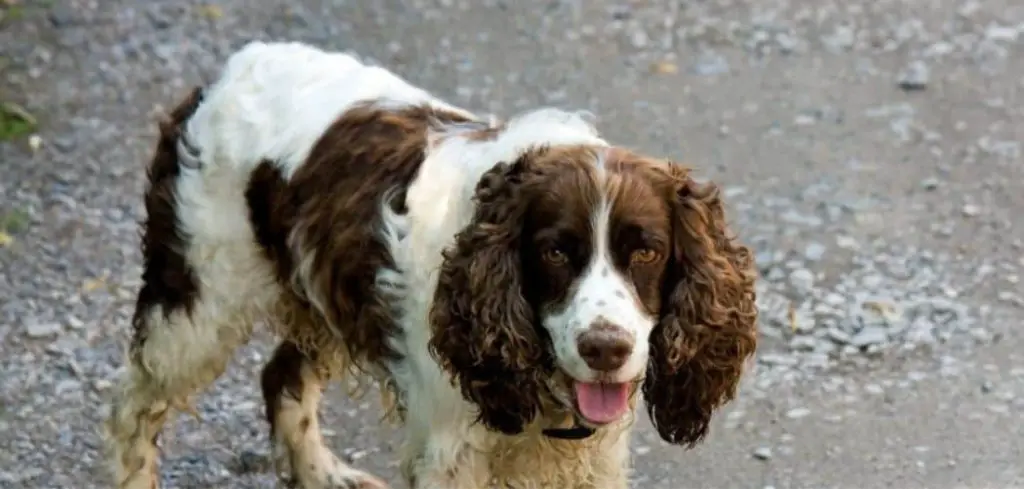If a dog is throwing up yellow and clear liquid, it’s often a sign that something is irritating the stomach or digestive system. While occasional vomiting may not be alarming, frequent or severe episodes can point to an underlying problem that needs attention.
We outline the common causes of a dog throwing up yellow and clear liquid, what you can do at home, and when to seek veterinary help.
Table of Contents
Dog Throwing Up Yellow and Clear Liquid — Why It Happens
When a dog vomits yellow and clear liquid, it is usually bile mixed with stomach fluids. This can happen for a variety of reasons, including an empty stomach, dietary issues, infections, pancreatitis, liver problems, or even more serious conditions like blockages.
Some dogs vomit bile in the morning before breakfast, while others may experience digestive distress after eating something unusual.

Dog Throwing Up Yellow and Clear Liquid: Common Causes
Empty Stomach (Bilious Vomiting Syndrome)
When a dog’s stomach stays empty for too long, bile can build up and irritate the stomach lining. This often leads to vomiting yellow liquid, sometimes first thing in the morning.
Pet owners may notice their dog appears hungry, restless, or licking their lips before vomiting. While it may not always be serious, frequent bile vomiting should not be ignored.
Read more: Dog Throwing Up Food and Clear Liquid (What it could mean)
Dietary Indiscretion
Dogs are curious eaters, and consuming spoiled food, grass, or foreign objects can irritate the digestive system. This often results in vomiting clear liquid or bile.
In addition to vomiting, dogs may have diarrhea, loss of appetite, or abdominal discomfort. Depending on what was ingested, the situation could be mild or life-threatening.
Gastrointestinal Infections
Bacterial or viral infections in the stomach and intestines can cause inflammation and vomiting. The vomit may appear as yellow and clear fluid when the stomach is mostly empty.
These infections can be accompanied by fever, lethargy, or diarrhea. Puppies and senior dogs are especially vulnerable to dehydration from vomiting.
Pancreatitis
Pancreatitis is an inflammation of the pancreas that disrupts digestion. Dogs with this condition may vomit bile and clear liquid due to irritation of the stomach and digestive tract.
Common signs include abdominal pain, hunched posture, lack of appetite, and fatigue. Pancreatitis can be mild or life-threatening, requiring prompt veterinary treatment.
Liver Disease
The liver plays an important role in bile production and detoxifying the body. When it is not functioning properly, bile-related vomiting can occur.
Dogs with liver disease may show other symptoms such as jaundice (yellowing of the eyes or gums), weight loss, and weakness. This is a serious cause that requires veterinary diagnosis and care.
Intestinal Blockage
A blockage in the intestines prevents food and fluids from passing through. Vomiting yellow and clear liquid may happen when the stomach cannot empty properly.
Other signs include severe abdominal pain, repeated vomiting, lack of bowel movements, and restlessness. This is an emergency and should be treated immediately by a vet.
What to Do If Your Dog Is Throwing Up Yellow and Clear Liquid
If vomiting happens only once and your dog otherwise seems healthy, you may monitor them at home. Offering a small, bland meal such as boiled chicken and rice can help settle the stomach.
If your dog tends to vomit bile when their stomach is empty, feeding smaller and more frequent meals may help prevent irritation.
Ensure your dog has access to fresh water at all times to prevent dehydration. If they are not drinking, try offering ice chips or low-sodium broth.
Keep a close eye on any additional symptoms like diarrhea, lethargy, or refusal to eat. These could indicate a more serious underlying condition.
When to Call or Visit Your Vet
Seek veterinary help if your dog vomits yellow and clear liquid repeatedly or shows signs of weakness, dehydration, or abdominal pain. Frequent vomiting is not normal and can quickly become dangerous.
If there is blood in the vomit, black or tarry stools, or signs of a blockage, contact a vet immediately. These are emergencies that require urgent care.
Dogs with chronic conditions such as pancreatitis, kidney disease, or liver problems should be evaluated promptly if they begin vomiting.
Puppies, senior dogs, and small breeds are at higher risk of complications from vomiting and dehydration, making early veterinary care especially important.
Read more: Dog Throwing Up Blood and Clear Liquid (Causes explained)
Key Takeaway
When a dog is throwing up yellow and clear liquid, it often points to bile irritation, digestive upset, or a more serious health condition.
While occasional vomiting may not be alarming, frequent or severe episodes require veterinary attention.
By monitoring symptoms, offering supportive care, and seeking timely help, pet owners can protect their dog’s health and address underlying issues effectively.
